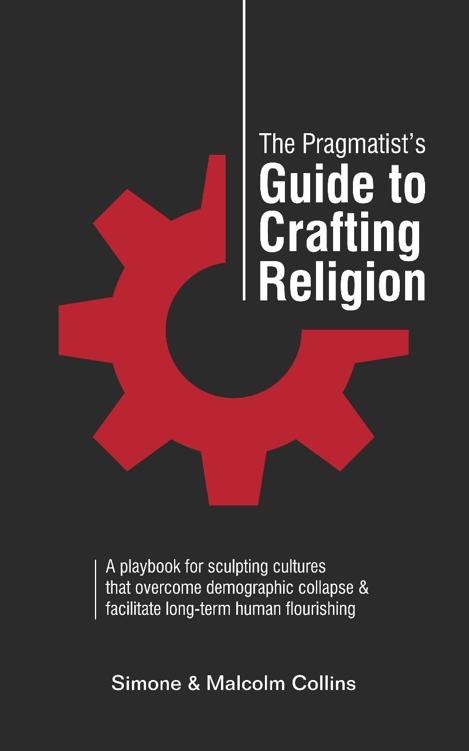Highlights from The Pragmatists Guide to Crafting Religion by Simone Collins, Malcolm Collins

Highlights from this book
-
Ironically, the risk to us from making these kinds of generalizations does not come from the cultures we are generalizing, as most are hard cultures, and very few hard cultures care about generalizations. Hard cultures are typically quite aware that they produce differential outcomes and are distinct from the rest of society—that’s kind of the point. Rather, the risk comes from pop culture variants that use the effective suppression of intellectual inquiry as a metric for status signaling
-
progressive movements support many prosocial causes that dovetail well with the promise of removing emotional pain21.
-
The worst part by far is that the supervirus very clearly has no off switch—it’s a paperclip maximizer of “no emotional pain” programmed into our social infrastructure and it is gaining steam.
-
This motivates individuals to spend more time converting people than spending the time and effort required to literally build a society that structurally embodies their values.
-
Humans have been bred to fear both death and change because those who accept change and impermanence with abandon are far less likely to survive and produce viable offspring.
-
(Consciousness in and of itself isn’t valuable;
-
Consider that each biological kid you have is 50 percent you. As soon as you have more than three kids, there is more of your biological identity (1.5X) in them than in you.
-
Better still, because most have the freedom to choose reproductive partners they admire, having kids yields an opportunity to augment individual biological identities by mixing them with those of people we respect and admire—people whose unique DNA will improve our own.
-
The destruction of identity is not an unwanted byproduct of progress but the core value of identity in the first place.
-
From the first nervous system to today, the cycle has been fueled by suffering, divergence, and conflict between and among individuals, species, and groups. This is not a flaw of the cycle or something to escape; it is the cycle.
-
But, one day, through a process red in tooth and claw, sapience will reach a state we cannot yet conceive where individuals will experience genuinely meaningful existence.
-
A study7 conducted in the U.K. in 2015 found that people with the surname Smith (descended from the smith caste) had higher physical capabilities and an above-average aptitude for strength-related activities, while those with the surname Tailor (descended from the tailor caste) had a higher-than-average aptitude for dexterity-related tasks.8 The treatment of Black populations
-
evolution is a cheap programmer
-
Conservatism as a political movement sees the individual as an avatar of their cultivar and optimizes for intergenerational fitness and cultural agency. In contrast, progressivism as a movement atomizes the individual and focuses on intragenerational quality of life and individual agency. That said, “conservatism” is not really one cohesive group as we often think of it but rather the manifestation of a number of hard cultural strategies optimized to protect intergenerational fitness.
-
The difference between conservative hard cultures and actual communists is the extent to which they trust state institutions to run things better than they do—or at least to not be a threat to them. The more an individual trusts their own community to be fair and well run, the less they will trust a government to interfere and the more “conservative” they will appear.